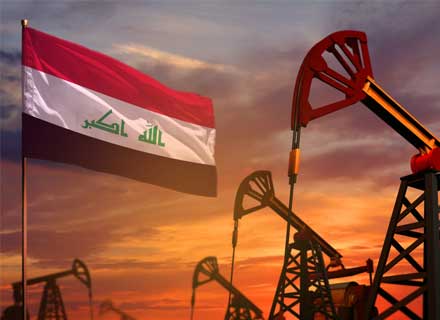Although operations have been halted for the last six months, a crude oil export pipeline from Iraq to Turkey is prepared to reopen, but flows have not yet resumed.
The pipeline is ready for exports to start, according to Turkey’s energy minister. However, two senior Iraqi oil officials recently claimed that Iraq has not received official word from Turkey regarding the pipeline’s readiness.
Iraq, the second-largest oil producer in OPEC, exports about 85% of its crude oil through ports in the south. However, roughly 0.5% of the world’s oil supply still comes from the northern route via Turkey.
According to Reuters, a top energy consultant, Iraq was also awaiting discussions on “lingering financial and technical issues.”.
What Caused The Shutdown?
In 2013, the Kurdistan Regional Government (KRG), which is semi-autonomous in Iraq, started exporting oil on its own.
Through a KRG pipeline, KRG exports are transported to Fish-Khabur on the northern border with Iraq. From there, the oil enters Turkey and is transported to the port of Ceyhan on the country’s Mediterranean coast.
Iraq’s federal government claims that the sole entity authorised to oversee crude shipments via Ceyhan is the state-owned marketer SOMO.
Turkey closed the pipeline as a result of the federal government of Iraq winning the authority to manage to load at Ceyhan. If Turkey hadn’t received instructions from Iraq’s SOMO on ship-loading, the crude would have accumulated in storage with nowhere to go.
Following an arbitration verdict by the International Chamber of Commerce (ICC) on March 23, which mandated that Ankara pay Baghdad penalties for unauthorised exports between 2014 and 2018, Turkey stopped oil exports through Iraq’s northern oil export route. The action caused oil prices to drop to about $80 per barrel.
Turkey ceased pumping about 450,000 barrels per day (bpd) of Iraqi oil to Ceyhan through the pipeline on March 25. This included 75,000 bpd of federal crude and 370,000 bpd of KRG crude, according to a person with knowledge of the pipeline’s operations.
Matters Of Dispute
In 2014, Iraq moved for arbitration at the International Court of Justice (ICC) in Paris regarding Turkey’s facilitation of oil exports from Kurdistan without Baghdad’s federal government’s approval.
Iraq claimed that Ankara and Turkish state energy company BOTAS had broken the terms of a 1973 pipeline deal between Iraq and Turkey by moving and storing oil from Kurdistan and putting it on tankers at Ceyhan without Baghdad’s consent.
According to a person familiar with the case who spoke to Reuters in March, the International Criminal Court upheld Iraq’s claim to be in charge of loading at Ceyhan and to be able to monitor what was being loaded.
According to sources, Turkey was also ordered to reimburse half of the discount on KRG oil sales. According to the person acquainted with the issue, Turkey owes Iraq a net amount of approximately $1.5 billion before interest, based on multiple verdicts. A Turkish source said that Iraq had first asked for roughly $33 billion.
A second arbitration case covering the years 2018 through 2022 might take up to two years.
Following the court verdict, the governments of Turkey, Iraq, and Kurdistan have all issued statements; however, none of them have provided all the information on the ruling.
Furthermore, Baghdad is required by the treaty governing the pipeline to pump a minimum assured volume through it.
This might further complicate matters, according to an Iraqi official, and translates into a minimum payment to Turkey, regardless of the amount of crude that flows, as long as the pipeline is working.
The Pipeline Maintenance
Iraq said in May that Turkey’s request to inspect the pipeline and storage tanks for potential damage following a strong earthquake on February 6th coincided with the standstill in March.
While continuing their legal dispute over arbitration rulings, the two nations decided to hold off on resuming flows until after a maintenance assessment of the pipeline was finished.
Iraq filed a request to enforce the ICC arbitration ruling in April with a U.S. federal court. Ankara also declared last month that it was considering taking Iraq to court.
Turkey wants the U.S. lawsuit to stop, and one of the reasons Turkish President Tayyip Erdogan’s August visit to Iraq was postponed was the lack of progress in finding a solution to this problem.
Although there hasn’t been an official confirmation, sources have indicated that Erdogan will probably travel to Baghdad this month.
At a surprise industry gathering in Abu Dhabi on October 2, Turkish Energy Minister Alparslan Bayraktar declared that the pipeline’s maintenance was finished and that construction would resume within the next week.
Although officials have stated that conversations are continuing, Baghdad has not made any formal comments on the issue since.

